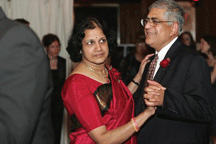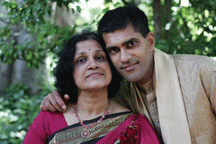Life
A Step Out Of Orbit

| I had this weird feeling as I sat down with my doctor to discuss my upcoming brain surgery. I couldn’t help thinking that it would have been the stuff of science fiction a century ago. Even a few decades ago, the thought of having brain surgery as a matter of choice would have been inconceivable.
I was about to undergo a procedure at the very bleeding edge of medicine, called Deep Brain Stimulation or DBS for short. It has given me relief from the symptoms of Parkinson’s disease, a condition I had been diagnosed with many years ago. It is a disease not very well understood; what is known is that there is a loss of cells that produce the neurotransmitter dopamine, responsible for initiating movement, in a part of the brain that is shrouded in mystery, called the Substantia Nigra.
Before my diagnosis, I had hounded doctors of every kind, and tried all the alternative therapies known to mankind, in the hope one of them could pin a label to the odd assortment of symptoms that were disrupting my life. I think I must have tried everything other than voodoo, which, I am reasonably sure, cannot be found in the suburbs of Chicago. Finally it was a neurologist at a well-respected hospital in Chicago, who made the diagnosis. He sounded almost gleeful as he announced “Mrs. Ramaswamy, what you have is Parkinson’s,” with a sense of drama that could have easily earned him an Oscar. I did not share his mirth. With the upbringing of two active, healthy boys at stake, I was not particularly amused by his diagnosis. As the doctor droned on – I was only partially listening to him by now – apparently, I was something of an anomaly, the profile of the typical Parkinson’s patient being 65, white and male. “Was I then merely masquerading as a 30-something Asian Indian female?” The idle thought ran through my mind. I vaguely remember him saying that with treatment, I could have a fairly normal life for the next 10-15 years. His words were of cold comfort to me as I drove home with an impending sense of doom, knee-deep in self-pity as I had visions of being unable to fend for myself, losing the one thing that meant so much to me – my independence. But my 15-year old put things in perspective with that wisdom peculiar to teenagers. After listening patiently to my story, he asked me the one question that was weighing heavily on his mind: what was I planning for dinner that night? That brought me back to the here and now in a hurry, and pretty much set the tone for my life, then on. “How soon can we expect a cure?” I asked my neurologist on my return visit. No betting man, he would not hazard a guess. Stem cell research, which holds the most promise, has been mired in politics. Scientists wring their hands and hope that politicians, who hold the keys, come to their senses and realize that the best hopes for cures for horrible diseases such as Parkinson’s and Alzheimer’s can only be found when research can be pursued unhindered.
Degenerative diseases, both Parkinson’s and Alzheimer’s, take a cruel toll on the patient and the family. The patient steps out of orbit and the family is left to cope as best as it can. Spouses are the most cruelly affected, as they must be seen as supportive, for society demands it, while dealing with what is merely the ghost of the partner who once was. It is one lonely road, as activities such as walking, dancing, hiking, biking, all things that make for a good marriage, slowly fall out of the patient’s sphere. Meanwhile, dedicated medical professionals in the field continue to look for ways to relieve the symptoms of these dreadful diseases and the good news is that they have been largely successful. There is a whole arsenal of drugs with which a neurologist can now treat patients and although it takes time to arrive at the precise cocktail, it is possible to lead a fairly normal life for a good number of years. In my case, over time the drugs that had propped me up, slowly began losing their effectiveness and I began to slip. I reviewed the options available to me, which included pallidotomy and thalidotomy, both of which cause lesions in the brain. I shot them down immediately. I did not want any part of me dying before its time. When I am good and ready, I would like to go in one piece. My other choice was Deep Brain Stimulation. A procedure pioneered in France, it had been found very effective, particularly in patients of my age group, considered “young,” who responded well to drugs. Flattered that at 50 I was considered young by any yardstick, I was already in a good mood as the surgeon explained the process. It involved putting tiny electrodes in the brain and connecting it to a device, much like a pacemaker, which stimulated the production of the vanishing dopamine. It was less invasive, with minimal risk; DBS was truly manna from heaven. It was entirely reversible, in case a cure was found for Parkinson’s, which was the clincher for me. It was a long drawn out procedure, only because so little is known about the human brain, so they have to tiptoe around it. It is ironic that we have more precise data on the components of the soil on Mars, billions of miles away, than an organ that is found on every human on this earth. The brain is so complex, its workings so elusive, it remains a wondrous testament to the creative process. Other than my comfort – the vice in which they put my head prior to the surgery to keep it still had screws that were beginning to hurt after six or seven hours – and my vanity – the loss of my hair – the surgical procedure was a breeze. I wore a scarf for some time, pretending that my lack of hair was a big secret. To my chagrin it was a cause of endless amusement to my sons, the younger one dubbing me “The Great Baldini.” The two, however, I must admit, kept my feet firmly on the ground.
The period soon after the two procedures was difficult, plagued by accidents that resulted in several visits to the emergency room. But, surrounded by family and friends and plenty of reasons to live to the fullest, I am now well on the way to a complete recovery. Still fiercely independent, I drive myself to the grocery store, the mall and wherever else my fancy strikes. I am a testament to the efficacy of modern medicine and to the compassion of medical practitioners who care deeply about their patients. I have to make allowances for my condition – I use a walker to ferry me around; for without it I tend to wobble like a bowling pin! I don’t think we realize how far we have come from the days the barber also did double duty as surgeon. Modern medicine is nothing short of miraculous. Sure, they still don’t have a cure for cancer or Parkinson’s for that matter. But I am not complaining. |




You must be logged in to post a comment Login